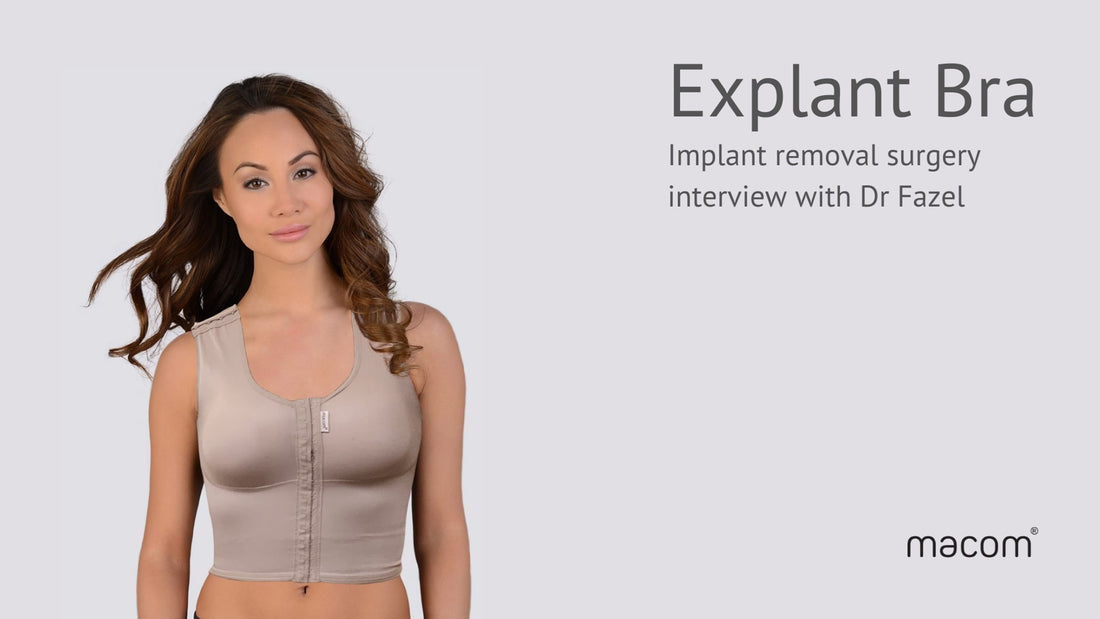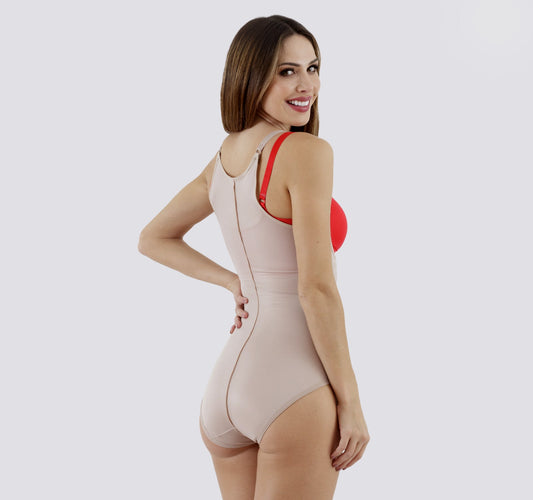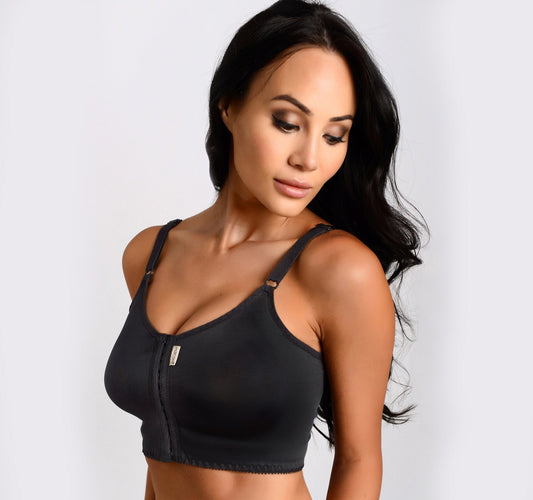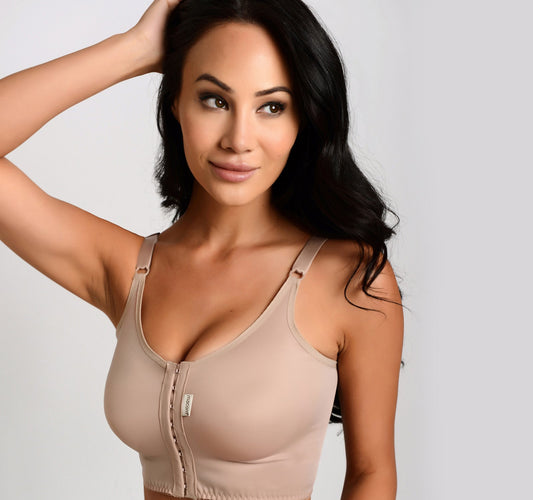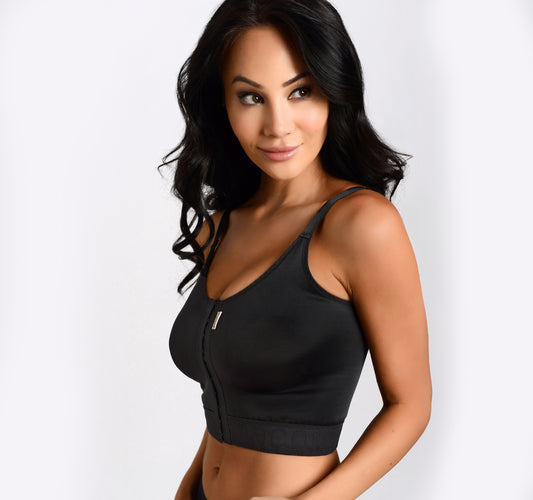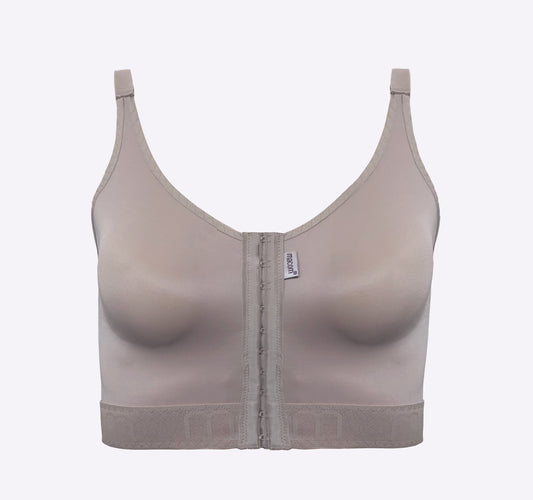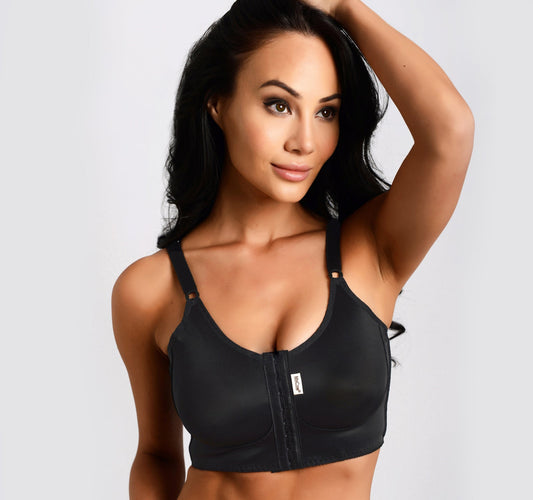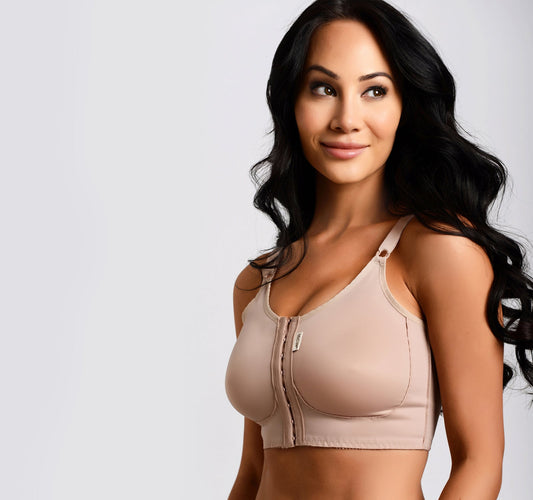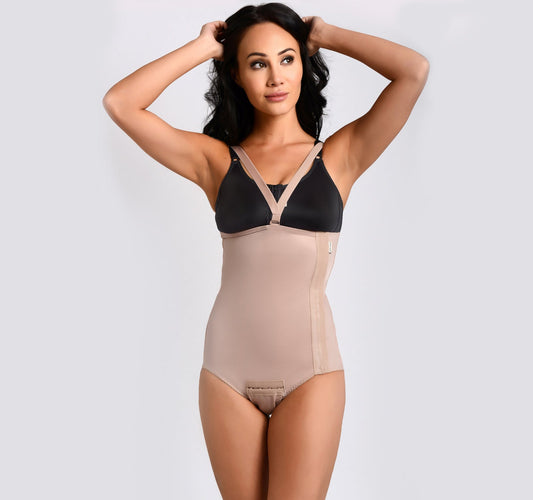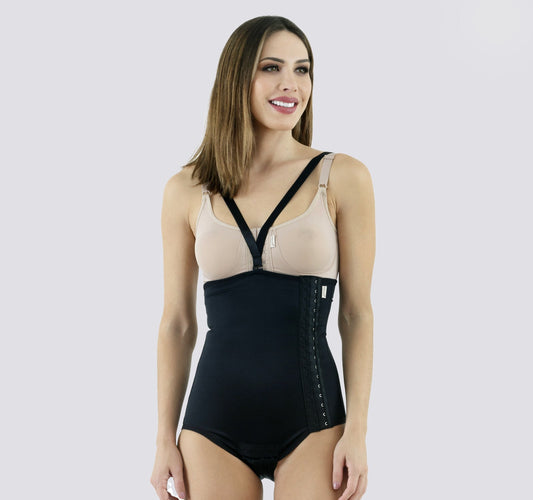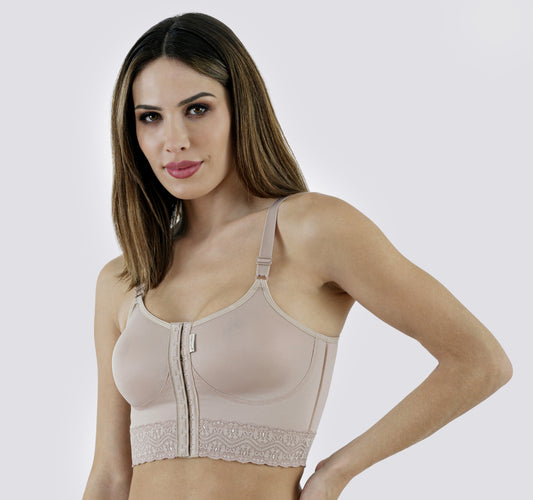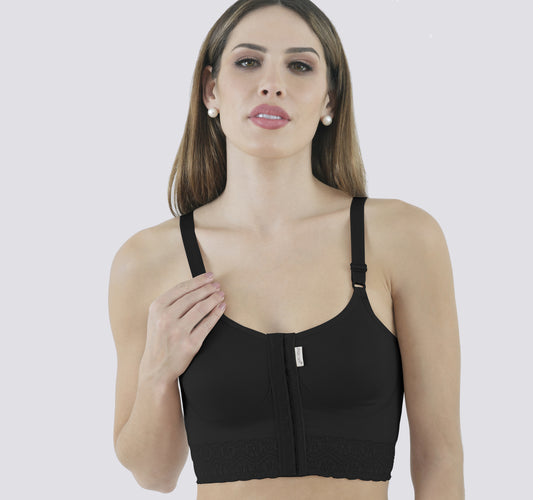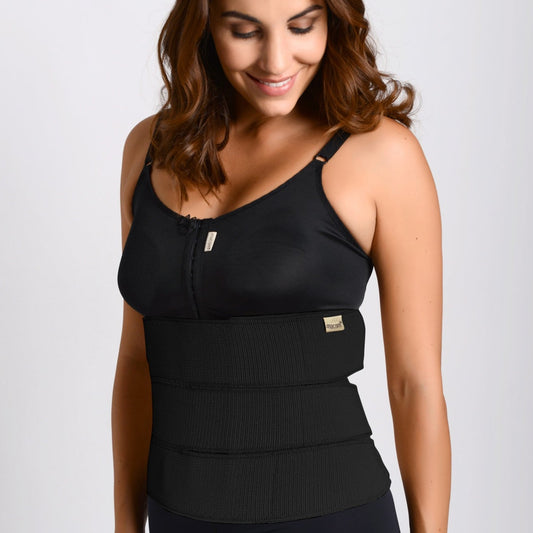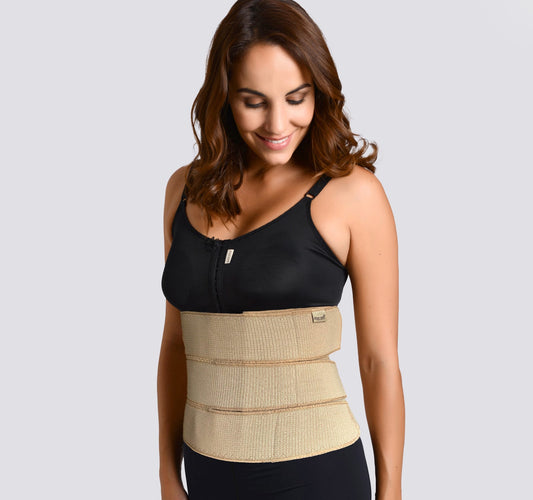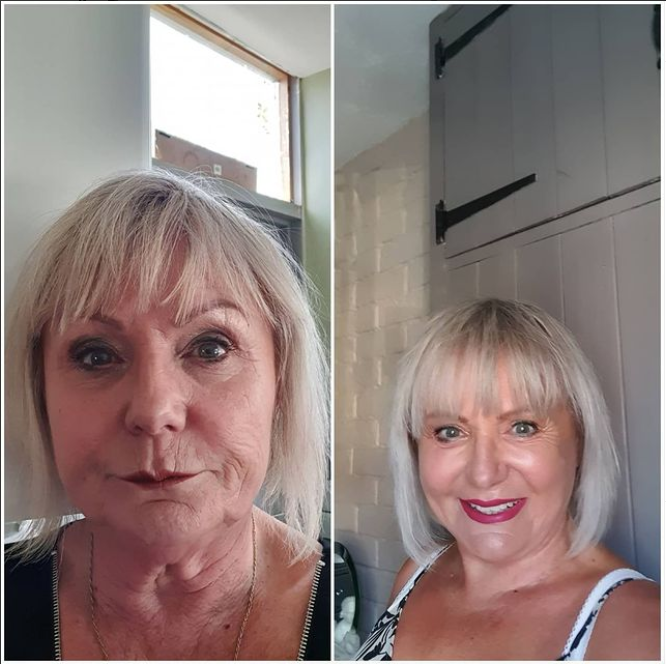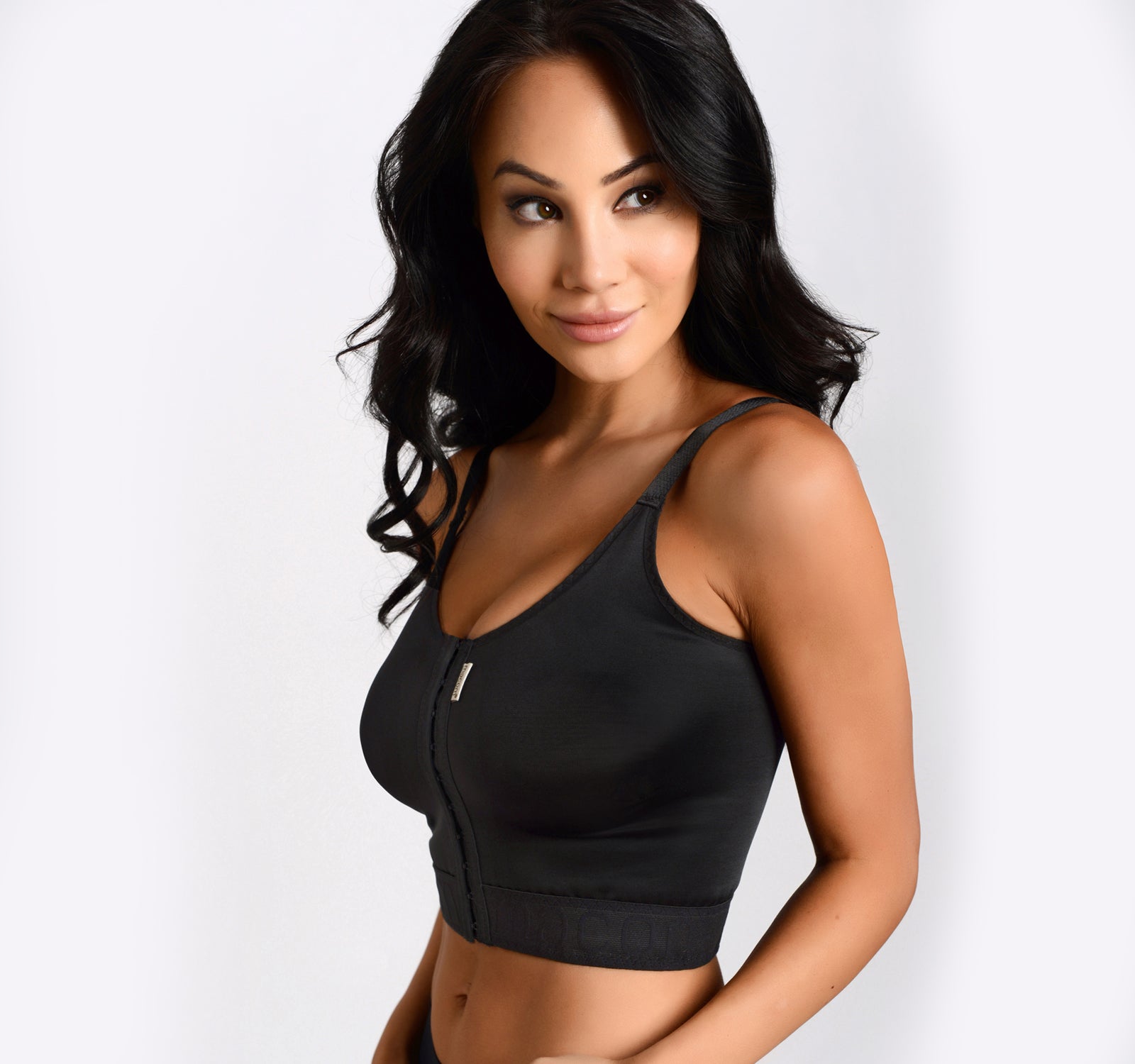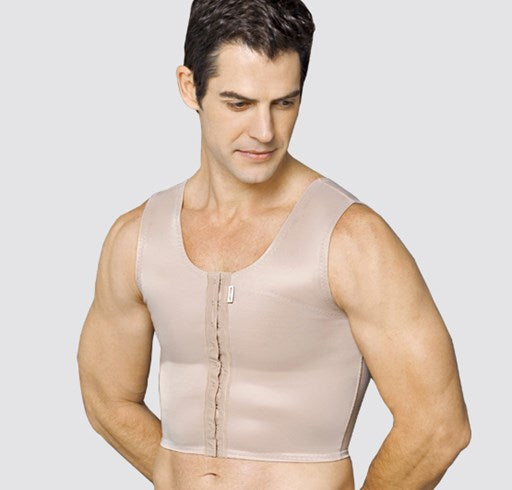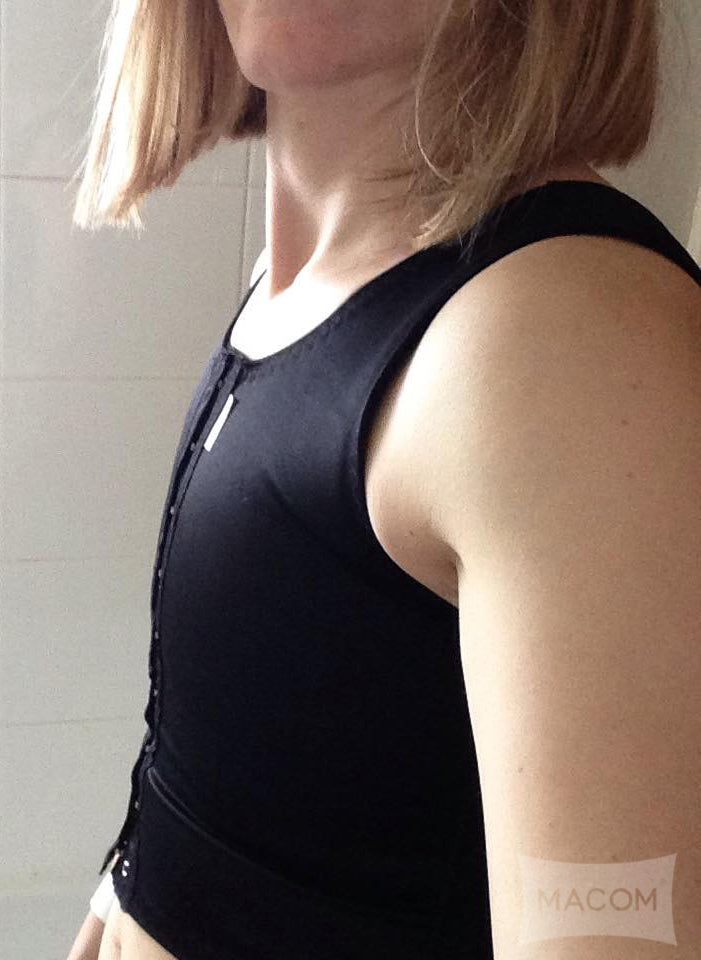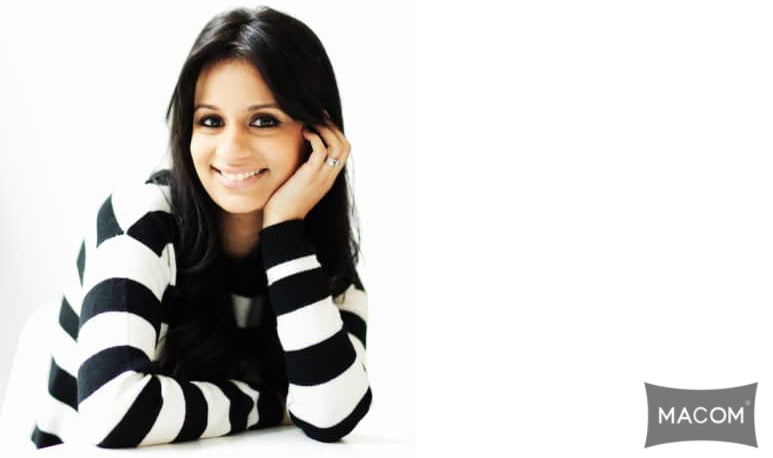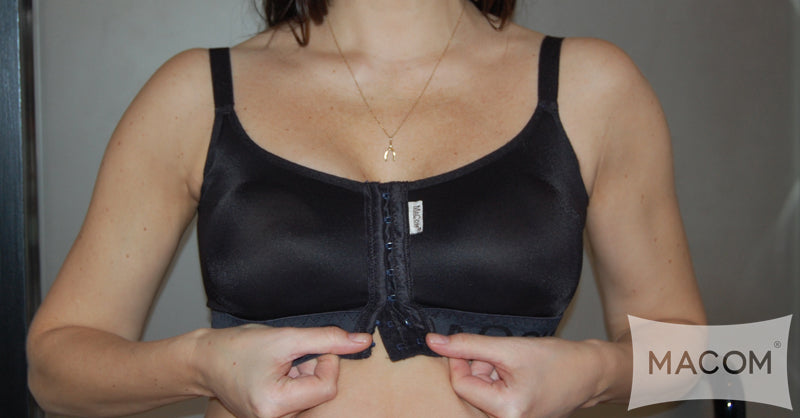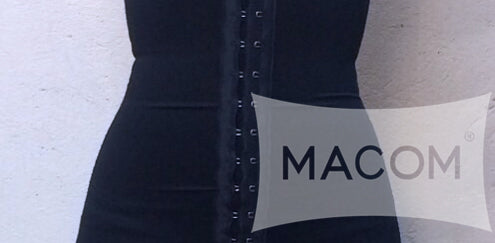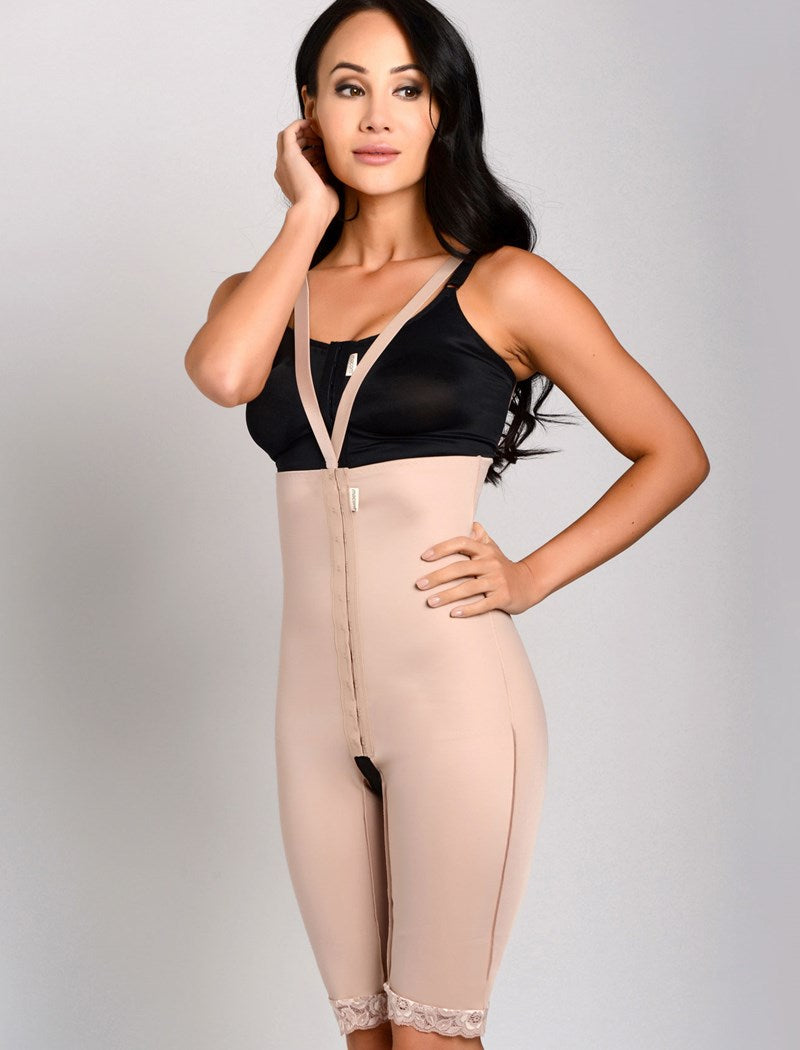Watch the interview
The video is also available on macom®'s YouTube channel: macom® talks breast explant surgery and new Explant bra with Dr Maisam Fazel. You can also find the full transcript below.
About the participants
Dr Maisam Fazel
Dr Maisam Fazel has been an Onco Plastic, Reconstructive and Aesthetic Surgeon for almost 12 years. In 2019, he won Best Onco Plastic Breast & Cosmetic Surgery Specialist in the Private Healthcare Awards.
Having read medicine at Cambridge University, where he was the recipient of the University Prize in Surgery, Dr Fazel went on to train and teach at international destinations, including Milan, Paris and London.
Although he has experience with a wide range of aesthetic procedures, his background is particularly focused on breast surgery. He is a consultant at clinics across England, in Birmingham, Buckinghamshire, Bristol and Northampton.
Nadja Collin
Nadja is the Marketing Director at macom®. She has worked within the medical and aesthetic industry for 15 years.
Nadja is well-versed in most surgical procedures and how compression will optimise recovery and healing. She has been privileged to work alongside some incredible surgeons and doctors over the years as well as guiding patients on their surgical journeys.
Nadja’s advice is always transparent, with an emphasis on safety, patient comfort, practicality and the longevity of the result.
Video Transcript
Introduction
Nadja: Good afternoon, Mr Fazal. How are you doing?
Dr Fazal: Good afternoon. Very well, how are you doing?
Nadja: I'm very good thank you. For those who might be new to your face and to mine, you are Mr Maisam Fazel. And, please correct me, you're an onco plastic reconstructive and aesthetic surgeon.
Dr Fazel: Correct, yes.
Nadja: Brilliant. And for those who don't know me, I'm Nadja and I'm one of the directors at Macom Medical and today we're going to be talking about the explant, the macom explant bra, and also about explant surgery, which is breast implant removal without re-augmentation.
Explant Surgery Statistics
Nadja: I was trying to find a little bit of statistics prior to you agreeing to do this little talk/interview with me. Unfortunately I couldn't actually find any statistics relating to explant surgery. Obviously with breast surgery there's lots of statistics available, but maybe we're just a little bit ahead of time, I suppose, in finding out the statistics. Or do you have any that you could share with me?
Dr Fazel: It's a really interesting thing actually, because in my own practice I have to say that, you know I've been doing this for close to 11 almost 12 years and, year on year I've seen a gradual increase in the number of people asking for an explant. So it's definitely an increasing trend. I don't believe nationally we have any robust statistics about this because, relatively, it's a very small percentage of people who choose to have their implants removed. But it's definitely a growing trend and I suspect that as it becomes more common, we should be able to have some statistics perhaps in a few years or so.
Nadja: Well time will tell.
Why women have breast implants removed
Nadja: Why do women have breast implants removed? Why is it happening?
Dr Fazel: Nadja, there's there's a number of reasons why women choose to have their breast implants
removed. I think I would break them down into four categories. The first is lifestyle, you know, people often might have a breast implant when they're younger. Not always when they're younger. And then as they get older they feel they no longer need them, or their lifestyle has changed, their criteria has changed, and in that sense they feel they no longer need that extra volume. So they might choose to have their implants removed.
Dr Fazel: The second category is: patients have had complications with breast implants. Breast implant surgery is extremely safe, it's very common and you know 98-99% of patients will have a completely uneventful recovery period. But you know ongoing maintenance of implants, for example
some patients may develop a capsular contracture, might have the implants changed once but get the capsule formation again. Or others might have had an implant rupture. And they might come to the decision that they no longer want to undergo this sort of routine maintenance surgery and perhaps they might wish to, at that stage, have their implants removed. So that's the second category.
Dr Fazel: The third is ALCL. Now this has become quite topical, you know. This is a breast implant associated with a type of lymphoma of the breast and fortunately it's extremely rare. I mean, the MHRA quoted as about 1 in 24,000, so that's very rare. But it's become quite topical and for patients
who have had the tests and have confirmed ALCL or have suspected ALCL, then the treatment would be to remove the implant and also to remove the capsule surrounding the implant in the en bloc fashion.
Dr Fazel: And then lastly, we're increasingly seeing patients who are defined as having a breast implant illness, and these are patients who for various reasons that we might touch upon this a bit later on feel that they have symptoms of being generally unwell because of their implants and, almost as a last resort, they'll decide to have their implants removed to see if they feel better. I would certainly say it's something that we're seeing an increasing growth in. So I'd say those are the four reasons.
What is breast implant illness?
Nadja: Yeah, breast implant illness, which a lot of people were also referring to as BII, which is the shorter term. That is something we definitely noticed from our end at Macom, we get more inquiries about it. So in your word, what is BII or breast implant illness?
Dr Fazel: So, breast implant illness. I think the first thing to say is that it's not really a recognized medical condition at present. And I think "at present" is a key word there, because in my experience, and I think talking to my colleagues as well, there is definitely a small, very small, group of patients in whom there seems to be a constellation of symptoms, ranging from: fatigue, weakness, joint aches, pains, having a slightly fuzzy head, headaches.
Dr Fazel: All these sorts of symptoms and they often have had lots and lots of tests at their GPs. Some of them have been to see a specialist and have immune tests and nothing has been found. And then almost as a last resort it's been postulated that their symptoms might be related to having these implants in, so they then decide to have their implants removed to see if they feel better and in my experience a lot of them, almost all of them will say that they feel better. Now this could be a placebo effect that they feel better because something has been done, but it might be something that's real. And I think at present we just don't know and I certainly think a lot more research needs to be done into this, and actually is now being done into this. That's an important sort of aspect of all of this that you know there is this condition out there that patients are experiencing and we as the medical professionals need to make sure we take it seriously. And of course you know when you have your implants removed there's absolutely no guarantee that you will feel better, and that's something that the patients need to be aware of before having their implants removed.
Nadja: Yeah, I mean likewise, in a way, obviously, when you consult someone for breast implants. You know initial consultation you can't say that you will get, or not get, BII, or any risk, So I suppose it's the same but in reverse. Having implants removed there's no guarantees with anything.
Dr Fazel: I was gonna say, absolutely, it's all about having sort of an open consultation with your surgeon at the time.
Nadja: Yes, yes exactly. Open conversations, you know, essentially a patient needs a valid consent but
having open conversations I think that is a key word.
What is an En Bloc Capsulectomy?
Nadja: Another thing we keep hearing a lot about is the technique of En Bloc capsulectomy, and I think
a lot of patients they sort of just ask for this technique. Not everyone's 100% sure what that exactly means, so what does En Bloc Capsulectomy mean?
Dr Fazel: So an En Bloc Capsulectomy really is a technical description of how the capsule is taken out. And what it really means is it's removing the entire capsule, the scar tissue that surrounds the implant, but doing it in a way that the implant is still contained within it. The rationale is that you know if you have anything within the capsule, it shouldn't spill out into the breast pocket as you take it out. So you take out the whole capsule with the implant inside and that's an En Bloc Capsulectomy, so this ensures that all of the capsule has been removed.
Dr Fazel: I really think there's one clear indication to do that and that's when you have a diagnosis of ALCL, or where you have a strong suspicion that you're dealing with a patient who has ALCL. Having said that there's lots of patients who, for various reasons why they're having implants removed, particularly the patients who are having them removed for breast implant illness, they will often request an En Bloc Capsulectomy. And in in my practice I will explain to them the pros and the cons, the risks and the ramifications, and as long as I'm satisfied that they understand this and they're happy to proceed then I will do an En Bloc Capsulectomy for those patients as well, wherever it doesn't pose a risk to them.
How long does an explant procedure take?
Nadja: Got it, and how long does an explant procedure, how long would an En Bloc Capsulectomy take?
Dr Fazel: This is a really important question because, you know, I've been online and I've looked at stuff on YouTube and even on the patient forums etc. And you know what really upsets me is that the general message out there is that this is an operation that takes 3 or 4 hours, it's a major operation. But the reality is that any operation has risks and occasionally an operation can take longer than expected. But, in my experience an En Bloc Capsulectomy should not take longer than an hour, maybe 1 hour and 15 minutes at the most. And it's done as a day case procedure. And I think that it's very important to inform patients, but it's equally important not to frighten them and give it a scenario that terrifies them.
Nadja: Yeah, see I thought it was longer than that. I've read quite a few horror stories when, you know,
there has to be a lot of scraping and patients under the general aesthetic for quite a long time. So I think that's quite reassuring to hear for a lot of people considering this procedure.
What do patients worry about the most?
Nadja: What do patients tend to worry about the most?
Dr Fazel: The first thing they worry about is how long will the surgery take, so we talked about that. The second is how will they look afterwards. Obviously this is the biggest concern so if you think about it from the patient's perspective, you know, they had the breast implant in the first place to be bigger, to be fuller, and now they're sort of going back and reversing that. But in addition to that, you then have the fact that the implants have been there maybe for a few years, the skin is stretched, aging has taken place. So they're worried about loss of volume and loose skin and sagginess. So that's a really big concern.
Dr Fazel: When you remove the implants, one thing that is going to be clear is that there will be a loss of volume, and depending on the quality of the skin, the size of the implants, and how long they've been there for, there may be some some droopiness and the need to tighten the skin. So things
that we talk about at that stage are the possibility of some skin tightening procedures, which
may involve a scar, for example around the nipple or around the nipple and down like a lollipop,
which may also be combined with an uplift if that's needed. And then lastly, you can combine all of
this with some fats. So to take some fat from the patient and to fat graft it into the breast, if the patient has fats of course, and that can sort of reduce some of these issues or concerns that patients have.
Nadja: Great.
Is explant surgery a day procedure?
Nadja: I think you already answered a lot of my next question, so it's a day case procedure right?
Dr Fazel: That's right. Patients would come in and as long as they're medically well they go the same day.
How do patients feel after explant surgery?
Nadja: And how can a patient expect to feel after the procedure, when you come around from your anaesthetic and then you leave? How do you generally–how do patients explain to you how they feel afterwards?
Dr Fazel: So the way that most patients describe it to me is that they have discomforts. The sort of thing that you might have if you went to the gym and you had a big chest workout, you didn't warm up, and the next day you feel pretty sore. So that's how they feel.
Dr Fazel: I don't use drains, I don't think there's any need to use any drains so that's one less worry. But we give them painkillers for a week. Most patients in my experience will take painkillers for about three or four days, and then after that they might take a paracetamol as and when needed, but it's pretty unusual. I would say that roughly after about a week, maybe 10 days, they feel able to drive. Most patients, if they've got a desk based job, will probably be back to their jobs in about 10 days, two weeks. Sometimes faster actually.
Nadja: Brilliant.
How do explant bras help patients to heal?
Nadja: So up until last year, we at Macom, we really didn't have anyone call us up and asking about explant procedures. And it was rare, I mean five years ago it was hardly anything at all. But we noticed over the years we had more inquiries and we've always had a bra for explantation – which was similar to the garment we also use for transgender or top surgery.
Nadja: So it's a full compression bra, which was not the bra we're here to talk about today, but it's a bra – [shows black compression garment] which is black which wasn't great for today. But it's a full compression bra. But then, with obviously inquiries trickling through more for explantation, we decided to do a little bit of research into this and we asked patients, you know, how they felt wearing compression after having explantation.
Nadja: We got involved with people, like yourself. So, we met at BAAPS in October last year and we had a good chat about explantation procedures and the compression that would be needed. So the previous bra we had is full compression all over, and then we started talking about creating a retractable bra, and that's where our conversation sort of started. And we created this [shows garment] which is a bra which retracts back and helps to mold the remaining breast tissue into sort of a firmer, well pre-surgery form. So that's how we started talking.
Nadja: So what would you, in your words, why would an explant bra be important and how can that help a patient heal?
Dr Fazel: I remember our conversation at BAAPS really well actually because you see at that stage I was doing these procedures but I really wasn't happy with the bras that were available because they all
had a high compressive element to them and I felt that they were squashing the breasts almost into fried eggs which was really not the point of what we were trying to do.
Dr Fazel: So in my view the bra has to help reduce swelling, has to reduce seroma, but also has to be supportive and help mold the residual tissue into a decent breast shape and that's why, you know, when we're speaking about designing this bra, I think the the fact that, you know, the cup area is expandable is really important. Because it really does sort of help mold the new breast, as it were. And you know, of course you're going to continue to control the seroma, the swelling, but the other important thing that I think really helps is the fact that we've got a very well defined inframammary crease there, which I think really helps in the post settling period. So that's what we're really looking for. And I think for the patient to wear this and to maximize the best outcome they can get, at implant removal surgery, which is always going to be a challenge, I think a good bra is really important.
Nadja: Brilliant.
What else can a patient do to optimise their healing journey?
Nadja: Apart from compression, is there anything else a patient can do to optimise the healing journey?
Dr Fazel: Yes. I would say that something like manual lymphatic drainage can be helpful. It's not essential, but I think and particularly now with the COVID issues, you know, it may be tricky to organize. So I think that is helpful and then you know other things that are always good to do is:
to be upright and about mobile.
Dr Fazel: But you know, I really can't stress the importance of having the right bra, which has to be sort of comfortable as well. Because if it's not comfortable, they wouldn't wear it. And it has to be supportive so it's not a torture instrument. It's really for helping the correct shape to develop.
How long should patients wear an explant bra for (following surgery)?
Nadja: And how long would you recommend the patient to wear an explant bra after the procedure?
Dr Fazel: I would suggest that they wear it for at least six weeks, because most of the healing takes place over that period. If they feel there is some swelling beyond that, then I would say maybe up to
three months. But that's something–that's a judgment I make when I see my patients at the six week check, to see if they need to get to work for longer.
Nadja: Great. I think a lot of patients also say it's sort of–it's like a mental thing as well. You feel quite secure wearing compression afterwards. Do patients tell you that as well?
Dr Fazel: They do actually. Initially they are a little bit hesitant about wearing it and then
when it comes to six weeks they're a bit reluctant to take it off.
Nadja: Yeah, I find that, obviously when patients call us back and we sometimes get asked, you know, how long should I wear it then we always refer that back to the surgeon. And then if the surgeon says: well you're okay you can you don't have to wear it anymore, patients are almost a bit scared to take it off. It's a very comfortable garment as well.
What have explant patients said about wearing the bra?
Nadja: So we obviously, prior to launching this bra, we tested it on quite a few case studies as well. But you kindly tested it on one of your case studies yourself, so real life explant patients, one of the first
that got to try this bra, and do you want to tell me a little bit? How was her feedback?
Dr Fazel: The feedback was pretty positive actually. She liked it a lot. It was comfortable, she wore it for the full six weeks, and so her experience was very positive. But from my perspective, when I reviewed her, I also felt that it did exactly what we needed it to do, that it, you know, we didn't have issues with seroma nor with, you know, excess swelling. But I felt the breast shape molded quite well. So I think both from the surgeon and from the patient perspective, it was really quite encouraging.
Nadja: Brilliant. So, we involved your expertise into this, but we also asked quite a few manual lymphatic drainage therapists as well. And hence why this bra, as opposed to all the other Macom bras which got quite narrow straps, this one has slightly wider straps and it goes all the way up to the axilla. And we will explain, from a manual lymphatic drainage point of view, that it helps to drain–well optimize the lymphatic drainage. If you've got compression all the way up here and here [points at points on bra]. So that is one of the reasons why the design of the explant bra looks slightly different than all the other of the Macom bras, and it comes a little bit further down so it's got a slightly more long line. So if you have any swelling, obviously swelling goes down with gravity, so hopefully that should help with that as well.
How does sizing work with an explant bra?
Dr Fazel: I think the other other thing that's really good, and this is maybe, you know, you can shed more light on this, is the sizing of it. It is very easy, because clearly people are worried, you
know, when you have the implants removed, what size would they be? I think that that works very well when they phone your office.
Nadja: Yeah, so the sizing protocols with all the Macom bras has always been to make things as straightforward as could possibly be. So, because we go according to high street bras sizing, so we will never need to know someone's size prior to having an explanation. So whether you were an A or a B cup. It's not quite relevant to us whether you had a 210 or 460 cc implant, it doesn't matter because breast implants don't measure in A, B, C, D cup size as we're familiar with them in the high street.
Nadja: So we just need to know the high street back size so 32, 34, 36. Obviously in other countries they will be different because the measurement underneath the bust, under the IMF, that is not going to change after the procedure, it's just the bust itself.
Nadja: So because it's retractable you buy, so if I'm a 34 before the procedure, I get a 34 bra, which is a medium in Macom. And then the cups will retract back to whatever size the patients can be after the explanation. So, yes you're right on the sizing protocol, we always try to make it as easy as possible and I think that shouldn't be underestimated. You know, patients are quite nervous about many other things which you really helped to clear up today for a lot of women considering this procedure, but sizing shouldn't be one of the things they should worry about, in terms of what size to get in the compression bra.
Ending
Nadja: So I'm really grateful for taking the time to help us answer some of these frequently asked
questions that we do get, so thank you for that.
Dr Fazel: I'm happy to help. I think, thank you also, because this is a really important topic, you know, implant removal capsulectomy, the whole area, I don't think really is talked about enough, certainly in the mainstream, and so I think well done for coming up with a product that was much needed and also for bringing this topic to the fore.
Nadja: Thank you, it's a pleasure and hopefully we'll have more conversations like this moving forward and ultimately try to help these women going through this. I've personally had friends who've had
explantation, and I really understand what goes through someone's mind to decide to have something removed from their body which–you know I'm not saying breast implants signify someone's femininity but deciding to have them removed is a big decision for a lot of women. So yes, thank you for helping out, I really appreciate it.
Dr Fazel: Happy to, take care .
Nadja: Okay, have a lovely day, thank you.

